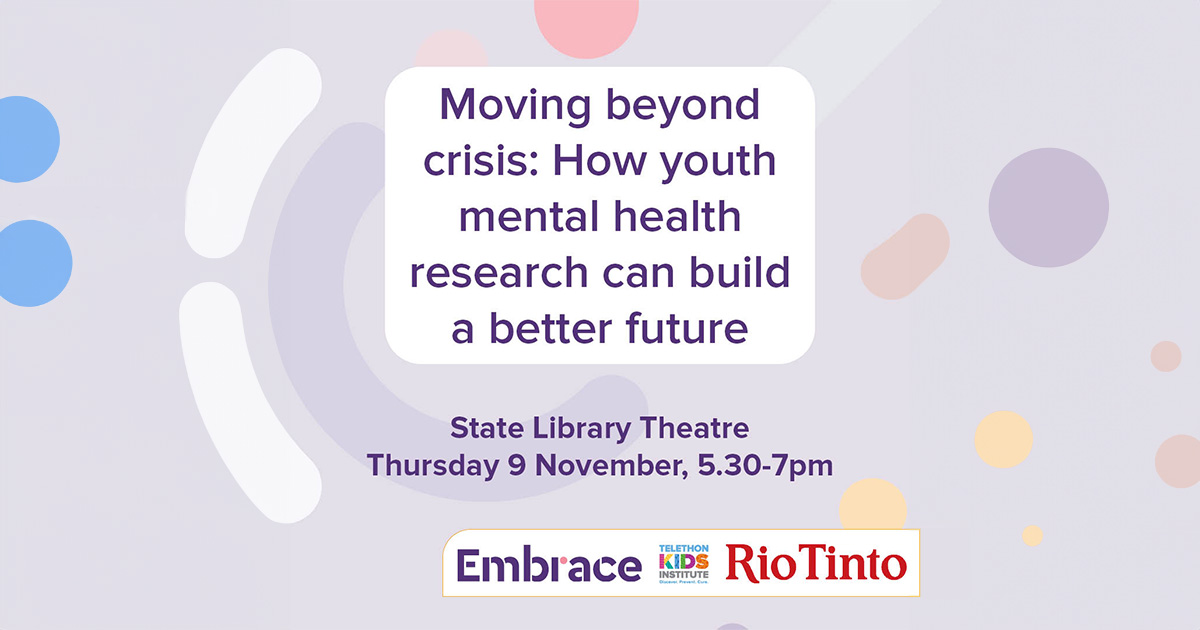Search

News & Events
Event: Moving beyond crisis: How youth mental health research can build a better futureOn the 9th of November from 5:30 to 7:30pm, Embrace @ The Kids Research Institute Australia, in partnership with Rio Tinto, invites you to a free public panel discussion on permacrisis and the mental health of young people.

News & Events
Poor access to mental health services linked to suicide hotspots: studyCommunities with poor access to mental health services are eight times more likely to be youth suicide hotspots, according to new The Kids Research Institute Australia research.

News & Events
Leading mental health champion recognised on 2023 Australia Day Honours ListProminent consultant psychiatrist and Western Australia’s 2021 Australian of the Year, Professor Helen Milroy AM, has been recognised as a Member of the Order of Australia (General Division).

News & Events
Prestigious grants to support lung health and suicide prevention researchTwo researchers focused on improving outcomes for children with chronic lung disease and averting suicide contagion and suicide clusters in young people have won prestigious Investigator Grants from the National Health and Medical Research Council.

News & Events
40under40 honour for suicide prevention researcherCongratulations Dr Nicole Hill, who has been honoured at this year’s prestigious 40under40 Awards for her outstanding contributions to suicide prevention research in Australia.

News & Events
Roadmap unveiled to support Aboriginal and Torres Strait Islander LGBTQA+ youthWalkern Katatdjin researcher and lead author Mx Shakara Liddelow-Hunt leads a conversation with the community on the key actions to include in the Roadmap.
Research
Cohort description: Measures of early-life behaviour and later psychopathology in the LifeCycle Project - EU Child Cohort NetworkThe EU LifeCycle Project was launched in 2017 to combine, harmonise, and analyse data from more than 250,000 participants across Europe and Australia, involving cohorts participating in the EU-funded LifeCycle Project. The purpose of this cohort description is to provide a detailed overview over the major measures within mental health domains that are available in 17 European and Australian cohorts participating in the LifeCycle Project.
Research
The anticipatory response to stress and symptoms of depression and anxiety in early adulthoodWhilst cortisol reactivity has been associated with depression and anxiety disorders, research examining cortisol reactivity with early symptoms of these conditions in males and females is limited.
Research
Climate change, activism, and supporting the mental health of children and young people: Perspectives from Western AustraliaThe climate crisis has detrimental impacts on the mental health and wellbeing of children and young people. Psychological effects include feelings of fear, overwhelm, worry, distress, hopelessness and anger; PTSD; depression; anxiety; phobias; panic disorder; sleep disturbances; attachment disorders; learning difficulties; substance abuse; shock and trauma symptoms; adjustment problems; behavioural problems; and, suicidal thinking.
Research
School-based depression and anxiety prevention programs: An updated systematic review and meta-analysisDepression and anxiety are often first experienced during childhood and adolescence, and interest in the prevention of these disorders is growing. The focus of this review was to assess the effectiveness of psychological prevention programs delivered in schools, and to provide an update to our previous review from five years ago (Werner-Seidler, Perry, Calear, Newby, & Christensen, 2017).
